Friendship in an Age of Economics
Friendship in an Age of Economics
Resisting the Forces of Neoliberalism
Todd May
LEXINGTON BOOKS
Lanham Boulder New York Toronto Plymouth, UK
Published by Lexington Books
A wholly owned subsidiary of The Rowman & Littlefield Publishing Group, Inc.
4501 Forbes Boulevard, Suite 200, Lanham, Maryland 20706
www.rowman.com
10 Thornbury Road, Plymouth PL6 7PP, United Kingdom
Copyright 2012 by Lexington Books
All rights reserved. No part of this book may be reproduced in any form or by any electronic or mechanical means, including information storage and retrieval systems, without written permission from the publisher, except by a reviewer who may quote passages in a review.
British Library Cataloguing in Publication Information Available
Library of Congress Cataloging-in-Publication Data
May, Todd, 1955
Friendship in an age of economics : resisting the forces of neoliberalism / Todd May. p. cm.
p. cm.
Includes bibliographical references and index.
ISBN 978-0-7391-7581-1 (cloth : alk. paper)
1. Interpersonal relationsPhilosophy. 2. FriendshipPolitical aspects. 3. FriendshipEconomic aspects. 4. Neoliberalism. 5. EconomicsSociological aspects. I. Title.
HM1161.M39 2012
302dc23
2012007554
 The paper used in this publication meets the minimum requirements of American National Standard for Information Sciences Permanence of Paper for Printed Library Materials, ANSI/NISO Z39.48-1992.
The paper used in this publication meets the minimum requirements of American National Standard for Information Sciences Permanence of Paper for Printed Library Materials, ANSI/NISO Z39.48-1992.
Printed in the United States of America
Acknowledgments
This little book has its roots in an online reading and discussion group of two I have had the privilege to conduct with Ladelle McWhorter over the past several years. We have wrestled with the question of the character of neoliberalism: what it is, what it does, what it makes of us. Eventually I began to wonder how we might discover ways to live around or outside of neoliberalism aside from the traditional political categories of resistance. It is here that the idea of thinking about friendship arose: I believe, and I hope the manuscript presents a case for this, that neoliberalism is destructive of deep or close friendships. Alternatively, I think that such friendships challenge neoliberalism: Those are the stakes of this book.
I could not have come to even the limited understanding of neoliberalism that I possess without those bi-weekly sessions with Del. In addition, several other people read parts of the manuscript and offered immensely helpful suggestions: Dick Bernstein, Chris Grau, my wife Kathleen, and Stephanie Wakefield. I also had the opportunity to present a paper that is an early version of what appears here under the title Friendship as Resistance to audiences at the New School for Social Research, Kings College at the University of Ontario, Manchester Metropolitan University, and at my home institution of Clemson University.
Finally, I was aided in this project by a sabbatical granted me by Clemson University. During that time, through the generosity of Simon Critchley and the faculty of the philosophy department of the New School, I was offered a course to teach and enough money to live for several months in New York while I finished the manuscript. During that time I was treated royally by many people at the New School, no one more so that Chiara Bottici, who, with her husband Benoit Challand, took me in as family.
This book is dedicated to my wife and (now grown) children: Kathleen, David, Rachel, and Joel. Daily they teach me the meaning of words like friendship and love.
Chapter 1
Neoliberalism
These are difficult times. Some would say they are dark times. As I write these lines, in the fall of 2010, unemployment in the United States is just under 10 percent. Countless people have lost their homes in the wake of the bursting of the housing bubble. The environment, through global warming and depleted resources, is threatening to take revenge on us for nearly two centuries of exploitation. Anger toward immigrants and members of other religions are poisoning our social relations and increasing xenophobia. Political polarization is decreasing trust not only in politicians but in the very processes of governance, leading to parties of rage like the Tea Party. The news media, which was once seen as a check on public abuse and the informal conscience of the citizenry, is now viewed as little more than either a mouthpiece for the left or right or a form of sensationalized entertainment.
This book is not another record of these dark times. It does not offer an analysis of how we came to this pass. It does not add to the literature on how to bring us back into the light. Its aim is a little more intimate. The topic of this book is not something that appears in the news or in most of the popular books that are being written about what appears in the news. It is instead about who we are, with ourselves and one another.
Part of the goal of these pages is to show how who we are, with ourselves and one another, is a product of our times, these times. In this sense, what is under consideration is linked to the ills I recounted a moment ago. In another sense, however, the phenomena we encounter here are deeper and more insidious than some of these ills. They will not pass with the turning of the economic cycle, and will likely survive the current xenophobia and particular expressions of political polarization. (Unfortunately, they will not likely outlast the environmental crises.) It may seem, then, that my theme is yet another lament in the litany that surrounds us. Here is another problem you hadnt yet noticed, a blight upon our character and our relations.
This would be, given the structure of this book, roughly a third right. The first part of the book is an analysis of the deleterious character of who we have been encouraged to be, particularly over the past thirty or forty years. It discusses two types of people, two figures as I will call them (in an echo of the historian and philosopher Michel Foucault) that, to one extent or another, many of our dominant practices seek to make of us. These two figures, the consumer and the entrepreneur, both stem from and reinforce some of the root causes of our current ills. And they will likely persist beyond at least some of those ills, contaminating our relations with one another and buttressing the root cause of many of the practices and institutions that plague us. If our days have become difficult ones, there are reasons for this. And if we are to overcome our difficulties, we cannot escape looking at those reasons.
On the other hand, at the level at which I am looking at our timesthat of our relations with one anotherthe news is not all bad. Not nearly so. Alongside whom we are often fabricated to be with ourselves and one another are ways of being that refuse that fabrication. These forms of refusal are as deeply woven into our character, and in many ways more deeply so, than the figures of the consumer and the entrepreneur. The focus here will be on one of those ways of being: friendship. We will see that certain kinds of friendship cut against consumerism and entrepreneurship, making us deeper and richer than these figures would have us be. Moreover, they also cut against the structure of practices that give rise to these figures, a structure that I will call, for lack of a better term, neoliberalism. I do not want to say that the forms of friendship I will describe here are the only ways in which our interpersonal relations resist neoliberalism and its figures. I will not, for instance, say much about love outside its place in friendship, as important as that is. However, I hope to offer some reflection on an arena of our lives that is central to who we are and to how we can begin to see beyond the difficulties into which we have been led.
Next page
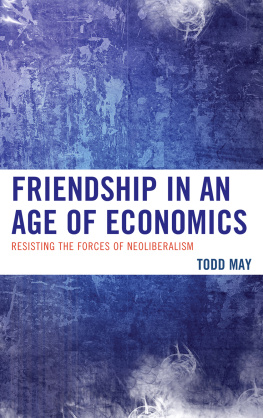
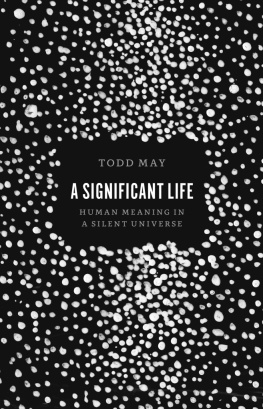


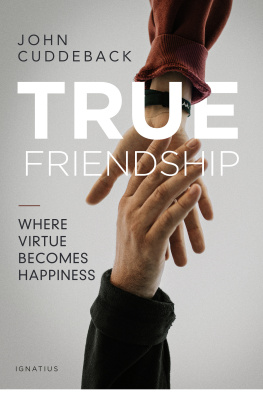
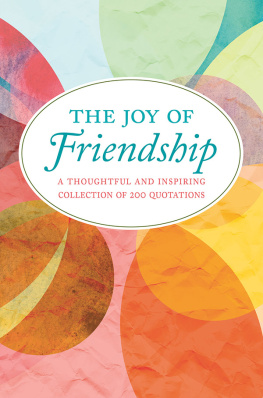
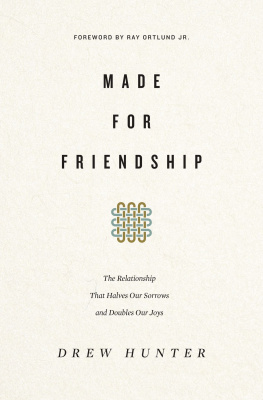
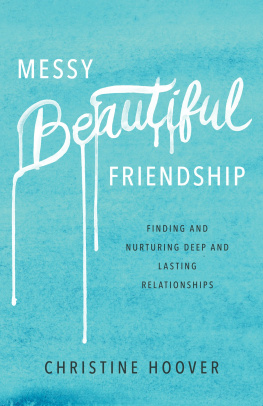
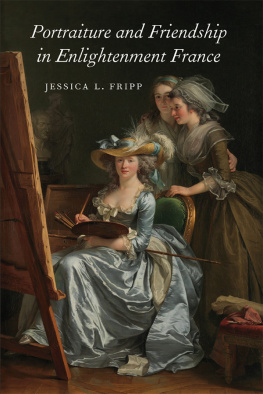
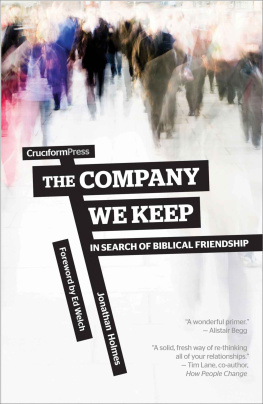

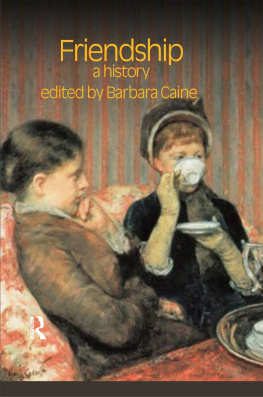
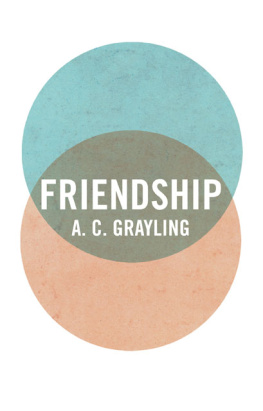
 The paper used in this publication meets the minimum requirements of American National Standard for Information Sciences Permanence of Paper for Printed Library Materials, ANSI/NISO Z39.48-1992.
The paper used in this publication meets the minimum requirements of American National Standard for Information Sciences Permanence of Paper for Printed Library Materials, ANSI/NISO Z39.48-1992.